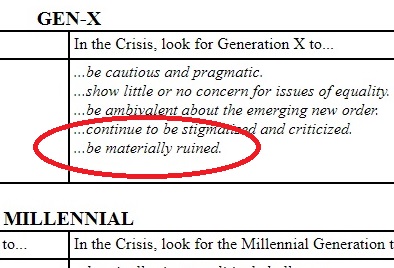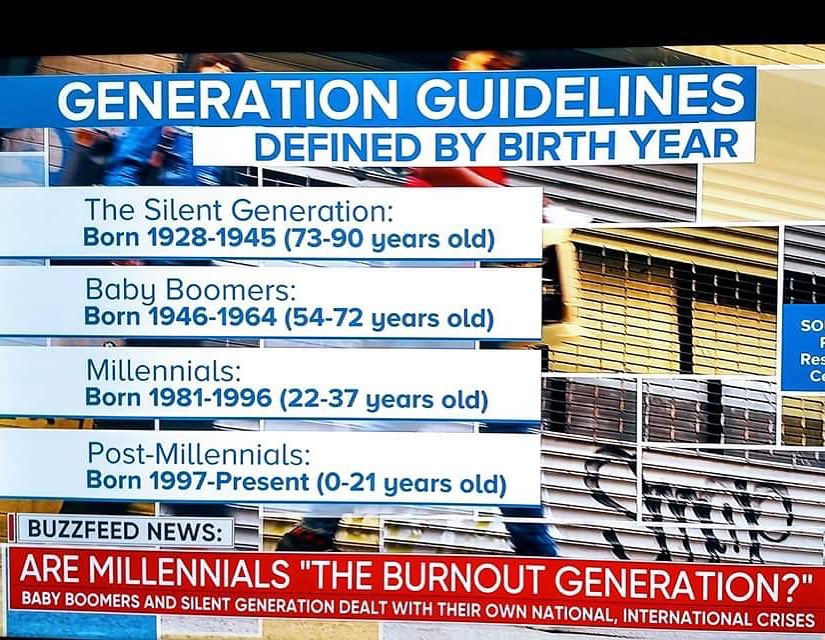Recently there was a meme going around that showed the living generations and their birth years, but with Generation X conspicuously absent. The responses from my generation came fast and thick, loaded with the expected amount of snark and ironic detachment.
The meme was circulating around the same time that Saturday Night Live aired a sketch called Millennial Millions – a parody game show in which Millennials had to withstand obnoxious, narcissistic Baby Boomers for a chance to win the same entitlements the Boomers already enjoyed – like health care, or a job. My generation was there in the form of the game show host, who had this memorable line: “I’m Gen-X, I just sit on the sidelines and watch the world burn.”
My generation has always had an instinct to keep to itself, to take advantage of opportunity when it presents itself, but otherwise stay in the background. It’s because of the hands-off way we were raised in the 1960s and 70s, a time of cultural upheaval when children were not a social priority. We learned to depend on ourselves, not to trust social institutions or the wisdom of our elders. And we’ve carried that attitude forward into mid-life, perhaps to our detriment.
Is Generation X really on the sidelines of life, ignored and forgotten? Let’s took a look at the impact we have had in different spheres of life. We can also look at some of the best known Gen-Xers for insight.
As I pointed out in an earlier blog post, Generation X comprises everyone in their late 30s through late 50s. These are the prime years of life – we are at the peak of our careers, growing in responsibility and taking over leadership roles. The culture may decry Boomers living too long and keeping good jobs away from Millennials, but it is really Gen-Xers occupying all those managerial positions. It’s Gen-Xers who have driven the digital transformation of the economy, and the remarkable productivity gains which have given us our prosperous commercial age.
The most successful Gen-Xers in business, particularly in the dot.com world, have been greatly influential in forging the modern zeitgeist. But only a few are really prominent, like Amazon founder Jeff Bezos, and Tesla founder Elon Musk. Other founder-CEOs are responsible for much of the background of modern life, but aren’t as well known – Google’s Larry Page and Sergey Brin, eBay’s Pierre Omidyar, Uber’s Travis Kalanick and Garrett Camp. The iconic Internet startup-CEO is a Millennial, Mark Zuckerberg. And no highly successful Gen-X entrepreneur has the stature of the two great Boomer godfathers of the digital age – Bill Gates and Steve Jobs.
In politics, the influence of Generation X is also rarely noted, though we are integral to one of the remarkable political stories of the century – the rise to power of the Republican party. Gen-Xers were the most likely to embrace the Reagan Revolution in the “greed is good” 1980s, with its philosophy of deregulation and elevation of the free market. Like Michael J. Fox in Family Ties, we turned away from the hippie past to embrace a new era focused on the business of making money. Prominent Gen-Xers in politics today are mostly Republican, furthering that agenda. It’s as though left-leaning Gen-Xers are just not interested in getting involved.
In the 2016 presidential election the two Gen-Xers who made it the furthest in the primaries were Republicans Ted Cruz and Mark Rubio. With the subsequent Republican takeover of the government, it seemed that unfettered individualism had triumphed. This may be mostly a Boomer accomplishment, but it is one in which the Gen-X go-it-alone ethos has been complicit.
Since 2018, the tide has started to turn against Republican dominance. If a progressive wave does sweep away the current regime, if the Presidential administration does collapse from its corruption, Gen-Xers who hitched themselves to the Republican success story will find themselves sidelined. But Gen-Xers on the Democrat side aren’t likely to become prominent as a result. The political narrative of Democratic regeneracy is focused on the needs of the young generation, and the up-and-coming Democrat who is making the biggest waves today is a Millennial.
Media and entertainment is perhaps where Generation X enjoys the most eminence. A look at the highest paid film stars shows a lot of Gen-X faces. Gen-X has always been obsessed with pop culture, and now that we are in the peak of life, it’s like Gen-X content creators are finally getting the chance to realize the imaginative visions of their youth, aided by all the advances in computing and audiovisual technology. It’s no wonder so many of the franchises of our childhood years are springing to life in movie and television form. Gen-X also brings a bit of a dark touch; as I put it in an earlier post, we are in a large part responsible for a new film noir age.
As for the more serious side of media, Generation X has had less luck supplanting previous generations of journalists and news reporters. Part of the problem is that we peaked at the same time that “fake news” became a thing, and that the public stopped trusting traditional media. The great Gen-X opinion shapers are actually the sarcastic, fake news types, like Jon Stewart, or Stephen Colbert. It’s like not taking anything seriously has been our great contribution to the culture.
In family life, it’s Generation X whose live-and-let-live attitude has given us the diversity of the Modern Family, up-ending traditional family values. Not that Gen-Xers don’t support family – we are fiercely loyal and dedicated to those we love. After a childhood during a social era of family disintegration, we seek in mid-life to rediscover family life. We also are the ones who introduced work-life balance, turning away from the workaholic careerism of the Boomer generation. For us, for the most part, work is a necessity for survival, not a calling.
The main way in which the influence of Gen-X on family life is commonly regarded, if not acknowledged as a Gen-X trend, is in the rise of overprotective parenting – a reaction to the underprotective parenting of our childhood. A common kind of meme in social media feeds is one extolling the good old days of laxer parenting, and boasting about how a mid-lifer (70s or 80s kid) got along just fine without all the child protective rules and regulations of today. The irony is that a Gen-X parent might post such a meme, and might enjoy such a meme, but is unlikely to actually change parenting styles.
This high level look at Generation X shows how our ethos of individualism and self-determination has influenced our contributions to society. On the one hand, our productivity and innovation have helped sustain the great economic boom of the post-war period. Our tolerance and open-mindedness have helped to give us a society that is more diverse and full of opportunities for all than that of the past.
On the other hand, our avoidance of group participation – even denial of its value – hampers society’s ability to find solutions where collective action is required. This means long standing problems such as wealth inequality and the lack of affordable healthcare and education remain unsolved. As time marches on, Generation X has to be careful not to let its instinct for non-participation cause it to be fully sidelined, should a progressive or quasi-socialist regime supported by younger generations rise to power.
Gen-Xers still have many peak years of life left in which to make our contribution to history. In the transformative years that lie ahead, our generation may well produce new leaders from unexpected places. As the old order dies and a new one takes its place, we may find ourselves in positions of unprecedented power – and surprise the world with what we do with it. The story of Generation X is not over yet.





